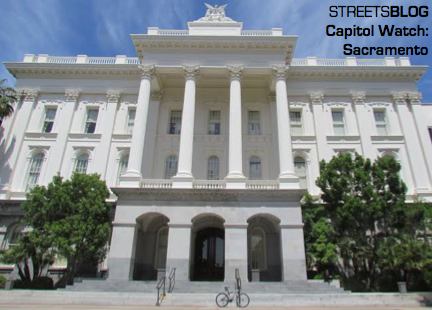Here's Streetsblog’s weekly highlight of legislation and events related to sustainable transportation moving through the legislative process in Sacramento.
- Bike Racks on Buses: A.B. 2707, Ed Chau (D-Monterey Park), would allow transit agencies to install racks that can carry three bikes on the front of buses. Why does this require legislation? Current law limits the total length of buses to 45 feet, but buses are longer than ever, many now 40 feet long and longer. A rack that can hold three bikes would put some buses over the legal limit. At the same time, more people want to bring their bikes with them when they ride the bus, and the two-bike racks on most buses have become inadequate.
In 2009, AC Transit in the San Francisco Bay Area got special legislation passed allowing it to put three-bike racks on its longer buses, with some caveats: for any bus longer than 40 feet, a team of reviewers had to inspect the bus route and decide whether a bus with a longer bike rack could safely navigate it, and the agency had to report back to the legislature at the end of 2014 about whether the longer racks caused problems.
Meanwhile, two other agencies got permission for the longer racks: Gold Coast Transit in Ventura and Sacramento Rapid Transit. With L.A. Metro and San Diego and others wanting to install three-bike racks, a statewide approach makes more sense. A similar bill from Rocky Chavez (R-Oceanside), A.B. 1684, which focused on North County Transit Agency buses, was dropped because this statewide bill would cover the issue.
A.B. 2707 passed out of the Assembly Transportation Committee on Monday and then was passed in a floor vote by the entire Assembly. It now goes to the Senate.
- Bicycle Infrastructure: S.B. 1183, Mark DeSaulnier (D-Concord), passed out of the Senate Transportation Committee on a narrow 6-4 vote.
This bill, which Streetsblog has reported on several times, would allow a city, county, or regional park to propose a motor vehicle registration fee, capped at $5, and submit it to voters. The bill is sponsored by the East Bay Regional Park District (EBRPD), which has received grants to build a network of bike paths that connect to BART and Amtrak, but cannot use grant money for their maintenance and repair. These paths, said Robert Doyle, director of the EBRPD, are now “a major piece of the transportation network” and data show they are used for commuting to work and school and for shopping trips, as well as recreation.
DeSaulnier had to reassure the other senators that the final wording would make it clear that any proposed fee would have to be passed by a supermajority, two-thirds of the voters, before he got the votes he needed.
Read about more legislation, including the first steps towards a Vehicle Miles Traveled Fee, electric bicycles, and vehicle retirement after the jump.
- Vehicle Miles Traveled Fee: S.B. 1077, also from DeSaulnier, passed more easily out of the Transportation Committee (9-0). It would set guidelines for creating a pilot project to test the efficacy of a VMT fee as a substitute for the gas tax, the idea being that people would pay for infrastructure according to how much they drive, not how much fuel they use. Declining gas tax revenues from fuel efficient cars, and the idea that people should pay for repair on the roads they drive, are the guiding principles behind a VMT fee, which has had a successful opt-in pilot in Oregon. The bill is now added to the pile in Appropriations.
- Electric Bicycles: A.B. 2173, Steven Bradford (D-Gardena) would allow what it's calling “low-speed electric bicycles” in bike lanes and paths. The bill passed the Assembly Transportation Committee 15-0 and goes on to Appropriations.
- Vehicle Retirement and Replacement: S.B. 1275, Kevin DeLeon (D-Los Angeles), requires the California Air Resources Board (CARB) to add public transportation and ridesharing options to its programs offering incentives for getting rid of polluting vehicles, as alternatives to replacement vouchers. CARB is also required to improve outreach to low-income communities, which are currently not benefitting from clean-vehicle incentives, and the bill sets a goal of having one million zero-emission vehicles on the road by 2023. It passed out of the Senate Committee on Environmental Quality on a 6-1 vote, and now heads, with the rest of the bunch, to Appropriations.
For social media coverage focused on state-wide issues, follow Melanie @currymel on Twitter or like our Facebook page here.






